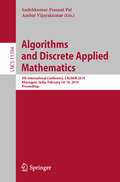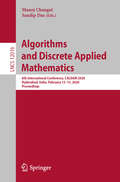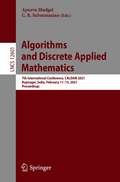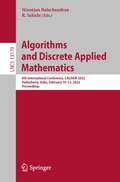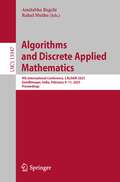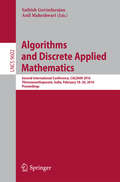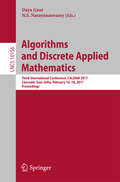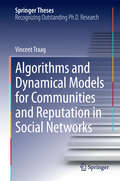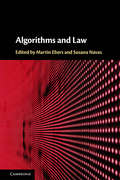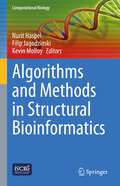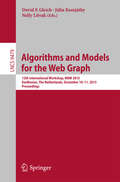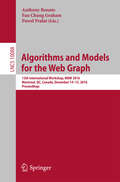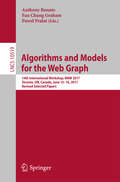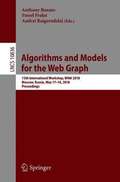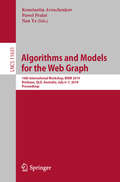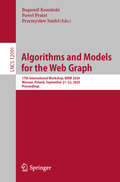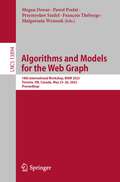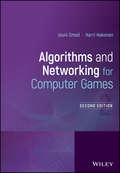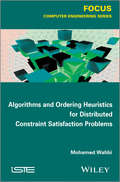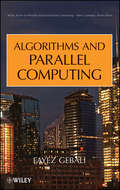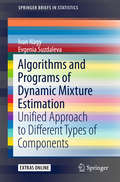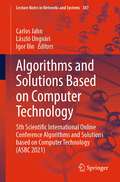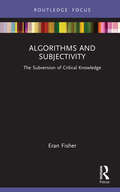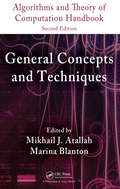- Table View
- List View
Algorithms and Discrete Applied Mathematics: 5th International Conference, CALDAM 2019, Kharagpur, India, February 14-16, 2019, Proceedings (Lecture Notes in Computer Science #11394)
by Sudebkumar Prasant Pal Ambat VijayakumarThis book constitutes the proceedings of the 5th International Conference on Algorithms and Discrete Applied Mathematics, CALDAM 2019, held in Kharagpur, India, in February 2019. The 22 papers presented together with 3 invited papers in this volume were carefully reviewed and selected from 86 submissions. The conference had papers in the areas of algorithms, graph theory, combinatorics, computational geometry, discrete geometry, and computational complexity.
Algorithms and Discrete Applied Mathematics: 6th International Conference, CALDAM 2020, Hyderabad, India, February 13–15, 2020, Proceedings (Lecture Notes in Computer Science #12016)
by Manoj Changat Sandip DasThis book constitutes the proceedings of the 6th International Conference on Algorithms and Discrete Applied Mathematics, CALDAM 2020, held in Hyderabad, India, in February 2020. The 38 papers presented together with 2 invited talks in this volume were carefully reviewed and selected from 102 submissions. The papers are organized in topical sections on graph algorithms, graph theory, combinatorial optimization, distributed algorithms, combinatorial algorithms, and computational complexity.
Algorithms and Discrete Applied Mathematics: 7th International Conference, CALDAM 2021, Rupnagar, India, February 11–13, 2021, Proceedings (Lecture Notes in Computer Science #12601)
by Apurva Mudgal C. R. SubramanianThis book constitutes the proceedings of the 7th International Conference on Algorithms and Discrete Applied Mathematics, CALDAM 2021, which was held in Rupnagar, India, during February 11-13, 2021. The 39 papers presented in this volume were carefully reviewed and selected from 82 submissions. The papers were organized in topical sections named: approximation algorithms; parameterized algorithms; computational geometry; graph theory; combinatorics and algorithms; graph algorithms; and computational complexity.
Algorithms and Discrete Applied Mathematics: 8th International Conference, CALDAM 2022, Puducherry, India, February 10–12, 2022, Proceedings (Lecture Notes in Computer Science #13179)
by Niranjan Balachandran R. InkuluThis book constitutes the proceedings of the 8th International Conference on Algorithms and Discrete Applied Mathematics, CALDAM 2022, which was held in Puducherry, India, during February 10-12, 2022. The 24 papers presented in this volume were carefully reviewed and selected from 80 submissions. The papers were organized in topical sections named: graph theory, graph algorithms, computational geometry, algorithms and optimization.
Algorithms and Discrete Applied Mathematics: 9th International Conference, CALDAM 2023, Gandhinagar, India, February 9–11, 2023, Proceedings (Lecture Notes in Computer Science #13947)
by Amitabha Bagchi Rahul MuthuThis book constitutes the proceedings of the 9th International Conference on Algorithms and Discrete Applied Mathematics, CALDAM 2023, which was held in Gandhinagar, India, during February 9-11, 2023.The 32 papers presented in this volume were carefully reviewed and selected from 67 submissions. The papers were organized in topical sections named: algorithms and optimization; computational geometry; game theory; graph coloring; graph connectivity; graph domination; graph matching; graph partition and graph covering.
Algorithms and Discrete Applied Mathematics: Second International Conference, CALDAM 2016, Thiruvananthapuram, India, February 18-20, 2016, Proceedings (Lecture Notes in Computer Science #9602)
by Sathish Govindarajan Anil MaheshwariThis book collects the refereed proceedingsof the Second International Conference on Algorithms and Discrete AppliedMathematics, CALDAM 2016, held in Thiruvananthapuram, India, in February 2016. The volume contains 30 full revised papers from 90 submissions along with 1invited talk presented at the conference. The conference focuses on topicsrelated to efficient algorithms and data structures, their analysis (boththeoretical and experimental) and the mathematical problems arising thereof,and new applications of discrete mathematics, advances in existing applicationsand development of new tools for discrete mathematics.
Algorithms and Discrete Applied Mathematics: Third International Conference, CALDAM 2017, Sancoale, Goa, India, February 16-18, 2017, Proceedings (Lecture Notes in Computer Science #10156)
by Daya Gaur N. S. NarayanaswamyThis book constitutes the proceedings of the Third International Conference on Algorithms and Discrete Applied Mathematics, CALDAM 2017, held in Goa, India, in February 2017. The 32 papers presented in this volume were carefully reviewed and selected from 103 submissions. They deal with the following areas: algorithms, graph theory, codes, polyhedral combinatorics, computational geometry, and discrete geometry.
Algorithms and Dynamical Models for Communities and Reputation in Social Networks (Springer Theses)
by Vincent TraagA persistent problem when finding communities in large complex networks is the so-called resolution limit. This thesis addresses this issue meticulously, and introduces the important notion of resolution-limit-free. Remarkably, only few methods possess this desirable property, and this thesis puts forward one such method. Moreover, it discusses how to assess whether communities can occur by chance or not. One aspect that is often ignored in this field is treated here: links can also be negative, as in war or conflict. Besides how to incorporate this in community detection, it also examines the dynamics of such negative links, inspired by a sociological theory known as social balance. This has intriguing connections to the evolution of cooperation, suggesting that for cooperation to emerge, groups often split in two opposing factions. In addition to these theoretical contributions, the thesis also contains an empirical analysis of the effect of trading communities on international conflict, and how communities form in a citation network with positive and negative links.
Algorithms and Law
by Martin Ebers Susana NavasAlgorithms permeate our lives in numerous ways, performing tasks that until recently could only be carried out by humans. Artificial Intelligence (AI) technologies, based on machine learning algorithms and big-data-powered systems, can perform sophisticated tasks such as driving cars, analyzing medical data, and evaluating and executing complex financial transactions - often without active human control or supervision. Algorithms also play an important role in determining retail pricing, online advertising, loan qualification, and airport security. In this work, Martin Ebers and Susana Navas bring together a group of scholars and practitioners from across Europe and the US to analyze how this shift from human actors to computers presents both practical and conceptual challenges for legal and regulatory systems. This book should be read by anyone interested in the intersection between computer science and law, how the law can better regulate algorithmic design, and the legal ramifications for citizens whose behavior is increasingly dictated by algorithms.
Algorithms and Methods in Structural Bioinformatics (Computational Biology)
by Nurit Haspel Filip Jagodzinski Kevin MolloyThe three-dimensional structure and function of molecules present many challenges and opportunities for developing an understanding of biological systems. With the increasing availability of molecular structures and the advancing accuracy of structure predictions and molecular simulations, the space for algorithmic advancement on many analytical and predictive problems is both broad and deep. To support this field, a rich set of methods and algorithms are available, addressing a variety of important problems such as protein-protein interactions, the effect of mutations on protein structure and function, and protein structure determination. Despite recent advancements in the field, in particular in protein folding with the development of AlphaFold, many problems still remain unsolved.In this book we focus on a number of topics in Structural Bioinformatics: Cryo-EM structural detection, protein conformational exploration, elucidation of molecular binding surface using geometry, the effect of mutations, insertions and deletions on protein structural stability, and protein-ligand binding.
Algorithms and Models for Network Data and Link Analysis
by François Fouss Marco Saerens Masashi ShimboNetwork data are produced automatically by everyday interactions - social networks, power grids, and links between data sets are a few examples. Such data capture social and economic behavior in a form that can be analyzed using powerful computational tools. This book is a guide to both basic and advanced techniques and algorithms for extracting useful information from network data. The content is organized around 'tasks', grouping the algorithms needed to gather specific types of information and thus answer specific types of questions. Examples include similarity between nodes in a network, prestige or centrality of individual nodes, and dense regions or communities in a network. Algorithms are derived in detail and summarized in pseudo-code. The book is intended primarily for computer scientists, engineers, statisticians and physicists, but it is also accessible to network scientists based in the social sciences. Matlab/Octave code illustrating some of the algorithms will be available at: http://www. cambridge. org/9781107125773.
Algorithms and Models for the Web Graph: 12th International Workshop, WAW 2015, Eindhoven, The Netherlands, December 10-11, 2015, Proceedings (Lecture Notes in Computer Science #9479)
by David F. Gleich Júlia Komjáthy Nelly LitvakThis book constitutesthe proceedings of the 12th International Workshop on Algorithms and Models forthe Web Graph, WAW 2015, held in Eindhoven, The Netherlands, in December 2015. The 15 fullpapers presented in this volume were carefully reviewed and selected from 24submissions. They are organized in topical sections named: properties of largegraph models, dynamic processes on large graphs, and properties of PageRank onlarge graphs.
Algorithms and Models for the Web Graph: 13th International Workshop, WAW 2016, Montreal, QC, Canada, December 14–15, 2016, Proceedings (Lecture Notes in Computer Science #10088)
by Anthony Bonato Fan Chung Graham Paweł PrałatThis book constitutes the proceedings of the 13th International Workshop on Algorithms and Models for the Web Graph, WAW 2016, held in Montreal, QC, Canada, in December 2016. The workshop gathered the researchers who are working on graph- theoretic and algorithmic aspects of related complex networks, including social networks, citation networks, biological networks, molecular networks, and other networks arising from the Internet.
Algorithms and Models for the Web Graph: 14th International Workshop, WAW 2017, Toronto, ON, Canada, June 15–16, 2017, Revised Selected Papers (Lecture Notes in Computer Science #10519)
by Anthony Bonato Fan Chung Graham Paweł PrałatThis book constitutes the refereed proceedings of the 9th International Workshop on Algorithms and Models for the Web-Graph, WAW 2012, held in Halifax, Nova Scotia, Canada, in June 2012. The 13 papers presented were carefully reviewed and selected for inclusion in this volume. They address a number of topics related to the complex networks such hypergraph coloring games and voter models; algorithms for detecting nodes with large degrees; random Appolonian networks; and a sublinear algorithm for Pagerank computations.
Algorithms and Models for the Web Graph: 15th International Workshop, WAW 2018, Moscow, Russia, May 17-18, 2018, Proceedings (Theoretical Computer Science and General Issues #10836)
by Anthony Bonato Paweł Prałat Andrei RaigorodskiiThis book constitutes the proceedings of the 15th International Workshop on Algorithms and Models for the Web Graph, WAW 2018, held in Moscow, Russia in May 2018.<P><P> The 11 full papers presented in this volume were carefully reviewed and selected from various submissions. The papers focus on topics like the information retrieval and data mining on the Web; Web as a text repository and as a graph, induced in various ways by link among pages, hosts and users; the understanding of graphs that arise from the Web and various user activities on the Web; stimulation of the development of high-performance algorithms and applications that exploit these graphs.
Algorithms and Models for the Web Graph: 16th International Workshop, WAW 2019, Brisbane, QLD, Australia, July 6–7, 2019, Proceedings (Lecture Notes in Computer Science #11631)
by Paweł Prałat Konstantin Avrachenkov Nan YeThis book constitutes the proceedings of the 16th International Workshop on Algorithms and Models for the Web Graph, WAW 2019, held in Brisbane, QLD, Australia, in July 2019. The 9 full papers presented in this volume were carefully reviewed and selected from 13 submissions. The papers cover topics of all aspects of algorithmic and mathematical research in the areas pertaining to the World Wide Web, espousing the view of complex data as networks.
Algorithms and Models for the Web Graph: 17th International Workshop, WAW 2020, Warsaw, Poland, September 21–22, 2020, Proceedings (Lecture Notes in Computer Science #12091)
by Bogumił Kamiński Paweł Prałat Przemysław SzufelThis book constitutes the proceedings of the 17th International Workshop on Algorithms and Models for the Web Graph, WAW 2020, held in Warsaw, Poland, in September 2020. The 12 full papers presented in this volume were carefully reviewed and selected from 19 submissions. The aim of the workshop was to further the understanding of graphs that arise from the Web and various user activities on the Web, and stimulate the development of high-performance algorithms and applications that exploit these graphs.Due to the corona pandemic the conference was postponed from June 2020 to September 2020.
Algorithms and Models for the Web Graph: 18th International Workshop, WAW 2023, Toronto, ON, Canada, May 23–26, 2023, Proceedings (Lecture Notes in Computer Science #13894)
by Megan Dewar Paweł Prałat Przemysław Szufel François Théberge Małgorzata WrzosekThis book constitutes the proceedings of the 18th International Workshop on Algorithms and Models for the Web Graph, WAW 2023, held in Toronto, Canada, in May 23–26, 2023.The 12 Papers presented in this volume were carefully reviewed and selected from 21 submissions. The aim of the workshop was understanding of graphs that arise from the Web and various user activities on the Web, and stimulate the development of high-performance algorithms and applications that exploit these graphs.
Algorithms and Networking for Computer Games
by Harri Hakonen Jouni SmedThe essential guide to solving algorithmic and networking problems in commercial computer games, revised and extended Algorithms and Networking for Computer Games, Second Edition is written from the perspective of the computer scientist. Combining algorithmic knowledge and game-related problems, it explores the most common problems encountered in game programing. The first part of the book presents practical algorithms for solving “classical” topics, such as random numbers, procedural generation, tournaments, group formations and game trees. The authors also focus on how to find a path in, create the terrain of, and make decisions in the game world. The second part introduces networking related problems in computer games, focusing on four key questions: how to hide the inherent communication delay, how to best exploit limited network resources, how to cope with cheating and how to measure the on-line game data. Thoroughly revised, updated, and expanded to reflect the many constituent changes occurring in the commercial gaming industry since the original, this Second Edition, like the first, is a timely, comprehensive resource offering deeper algorithmic insight and more extensive coverage of game-specific networking problems than ordinarily encountered in game development books. Algorithms and Networking for Computer Games, Second Edition: Provides algorithmic solutions in pseudo-code format, which emphasises the idea behind the solution, and can easily be written into a programming language of choice Features a section on the Synthetic player, covering decision-making, influence maps, finite-state machines, flocking, fuzzy sets, and probabilistic reasoning and noise generation Contains in-depth treatment of network communication, including dead-reckoning, local perception filters, cheating prevention and on-line metrics Now includes 73 ready-to-use algorithms and 247 illustrative exercises Algorithms and Networking for Computer Games, Second Edition is a must-have resource for advanced undergraduate and graduate students taking computer game related courses, postgraduate researchers in game-related topics, and developers interested in deepening their knowledge of the theoretical underpinnings of computer games and in learning new approaches to game design and programming.
Algorithms and Ordering Heuristics for Distributed Constraint Satisfaction Problems
by Mohamed WahbiDisCSP (Distributed Constraint Satisfaction Problem) is a general framework for solving distributed problems arising in Distributed Artificial Intelligence. A wide variety of problems in artificial intelligence are solved using the constraint satisfaction problem paradigm. However, there are several applications in multi-agent coordination that are of a distributed nature. In this type of application, the knowledge about the problem, that is, variables and constraints, may be logically or geographically distributed among physical distributed agents. This distribution is mainly due to privacy and/or security requirements. Therefore, a distributed model allowing a decentralized solving process is more adequate to model and solve such kinds of problem. The distributed constraint satisfaction problem has such properties. Contents Introduction Part 1. Background on Centralized and Distributed Constraint Reasoning 1. Constraint Satisfaction Problems 2. Distributed Constraint Satisfaction Problems Part 2. Synchronous Search Algorithms for DisCSPs 3. Nogood Based Asynchronous Forward Checking (AFC-ng) 4. Asynchronous Forward Checking Tree (AFC-tree) 5. Maintaining Arc Consistency Asynchronously in Synchronous Distributed Search Part 3. Asynchronous Search Algorithms and Ordering Heuristics for DisCSPs 6. Corrigendum to “Min-domain Retroactive Ordering for Asynchronous Backtracking” 7. Agile Asynchronous BackTracking (Agile-ABT) Part 4. DisChoco 2.0: A Platform for Distributed Constraint Reasoning 8. DisChoco 2.0 9. Conclusion About the Authors Mohamed Wahbi is currently an associate lecturer at Ecole des Mines de Nantes in France. He received his PhD degree in Computer Science from University Montpellier 2, France and Mohammed V University-Agdal, Morocco in 2012 and his research focused on Distributed Constraint Reasoning.
Algorithms and Parallel Computing
by Fayez GebaliThere is a software gap between the hardware potential and the performance that can be attained using today's software parallel program development tools. The tools need manual intervention by the programmer to parallelize the code. Programming a parallel computer requires closely studying the target algorithm or application, more so than in the traditional sequential programming we have all learned. The programmer must be aware of the communication and data dependencies of the algorithm or application. This book provides the techniques to explore the possible ways to program a parallel computer for a given application.
Algorithms and Programs of Dynamic Mixture Estimation: Unified Approach to Different Types of Components (SpringerBriefs in Statistics)
by Ivan Nagy Evgenia SuzdalevaThis book provides a general theoretical background for constructing the recursive Bayesian estimation algorithms for mixture models. It collects the recursive algorithms for estimating dynamic mixtures of various distributions and brings them in the unified form, providing a scheme for constructing the estimation algorithm for a mixture of components modeled by distributions with reproducible statistics. It offers the recursive estimation of dynamic mixtures, which are free of iterative processes and close to analytical solutions as much as possible. In addition, these methods can be used online and simultaneously perform learning, which improves their efficiency during estimation. The book includes detailed program codes for solving the presented theoretical tasks. Codes are implemented in the open source platform for engineering computations. The program codes given serve to illustrate the theory and demonstrate the work of the included algorithms.
Algorithms and Solutions Based on Computer Technology: 5th Scientific International Online Conference Algorithms and Solutions based on Computer Technology (ASBC 2021) (Lecture Notes in Networks and Systems #387)
by Igor Ilin Carlos Jahn László UngváriThis book is a collection of papers compiled from the conference "Algorithms and Computer-Based Solutions" held on June 8-9, 2021 at Peter the Great St. Petersburg Polytechnic University (SPbPU), St. Petersburg, Russia. The authors of the book are leading scientists from Russia, Germany, Netherlands, Greece, Hungary, Kazakhstan, Portugal, and Poland.The reader finds in the book information from experts on the most interesting trends in digitalization - issues of development and implementation of algorithms, IT and digital solutions for various areas of economy and science, prospects for supercomputers and exo-intelligent platforms; applied computer technologies in digital production, healthcare and biomedical systems, digital medicine, logistics and management; digital technologies for visualization and prototyping of physical objects.The book helps the reader to increase his or her expertise in the field of computer technologies discussed.
Algorithms and Subjectivity: The Subversion of Critical Knowledge (Routledge Focus on Digital Media and Culture)
by Eran FisherIn this thought-provoking volume, Eran Fisher interrogates the relationship between algorithms as epistemic devices and modern notions of subjectivity. Over the past few decades, as the instrumentalization of algorithms has created knowledge that informs our decisions, preferences, tastes, and actions, and the very sense of who we are, they have also undercut, and arguably undermined, the Enlightenment-era ideal of the subject. Fisher finds that as algorithms enable a reality in which knowledge is created by circumventing the participation of the self, they also challenge contemporary notions of subjectivity. Through four case-studies, this book provides an empirical and theoretical investigation of this transformation, analyzing how algorithmic knowledge differs from the ideas of critical knowledge which emerged during modernity – Fisher argues that algorithms create a new type of knowledge, which in turn changes our fundamental sense of self and our concept of subjectivity. This book will make a timely contribution to the social study of algorithms and will prove especially valuable for scholars working at the intersections of media and communication studies, internet studies, information studies, the sociology of technology, the philosophy of technology, and science and technology studies.
Algorithms and Theory of Computation Handbook, Volume 1: General Concepts and Techniques (Chapman & Hall/CRC Applied Algorithms and Data Structures series)
by Mikhail J. Atallah Marina BlantonAlgorithms and Theory of Computation Handbook, Second Edition: General Concepts and Techniques provides an up-to-date compendium of fundamental computer science topics and techniques. It also illustrates how the topics and techniques come together to deliver efficient solutions to important practical problems. Along with updating and revising many
